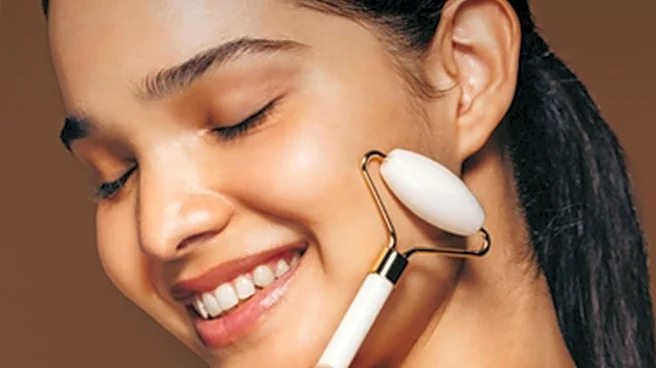What is the story about?
What's Happening?
Mintel, a leading market intelligence firm, has announced key predictions for the beauty and personal care (BPC) industry, forecasting significant changes by 2026 and beyond. The firm anticipates a shift towards 'Metabolic Beauty,' where health, technology, and personalization converge, transforming beauty products into wellness diagnostics. This evolution is expected to redefine beauty from indulgence to a science-backed approach, integrating cellular health and preventative measures. Additionally, 'Sensorial Synergy' will emphasize emotional wellness, with beauty products designed to regulate mood and evoke emotions. The 'Human Touch Revolution' will see consumers gravitating towards beauty that feels human and authentically imperfect, moving away from hyper-polished marketing and unrealistic aesthetics.
Why It's Important?
These predictions highlight a transformative period for the beauty industry, where the integration of health and emotional wellness could redefine consumer expectations and product offerings. As beauty brands evolve into partners in preventative care, they will provide products that enhance appearance while offering actionable health data. This shift could lead to increased consumer trust and loyalty, as brands showcase authenticity and human creativity. The focus on emotional wellness and sensory experiences may also expand into other sectors like travel and hospitality, creating new opportunities for cross-industry collaborations. Brands that successfully blend proven results with immersive storytelling are likely to thrive in this evolving landscape.
What's Next?
The beauty industry is poised for a significant transformation as brands adapt to these emerging trends. Advances in biomarker testing, continuous metabolic monitoring, and bio-intelligent technologies will become more accessible, enabling personalized solutions that optimize energy, hydration, and cellular repair. As consumers seek beauty experiences that feel deeply personal and creatively rich, brands will need to showcase their makers, processes, and even imperfections to build trust and authenticity. The industry may also see increased collaboration with healthcare providers and technology companies to develop innovative products that cater to the growing demand for wellness-driven beauty.
Beyond the Headlines
The shift towards wellness-driven beauty raises ethical and cultural considerations, as brands navigate the balance between scientific innovation and consumer expectations. The emphasis on authenticity and imperfection challenges traditional beauty standards, potentially leading to broader societal changes in how beauty is perceived and valued. This evolution may also prompt discussions on the role of technology in enhancing, rather than overshadowing, personal and authentic aspects of beauty. As the industry embraces these changes, it will be crucial to address potential privacy concerns related to health data and ensure equitable access to new technologies.















